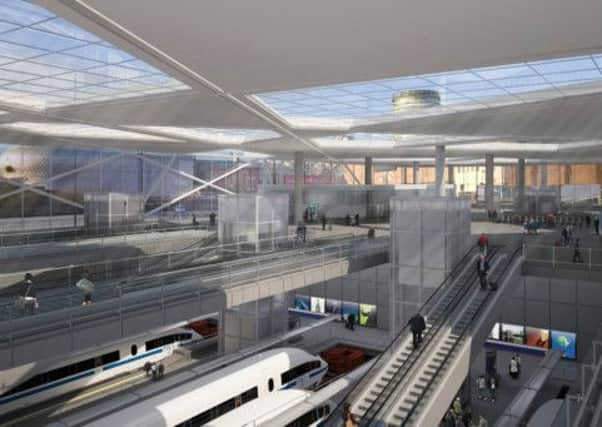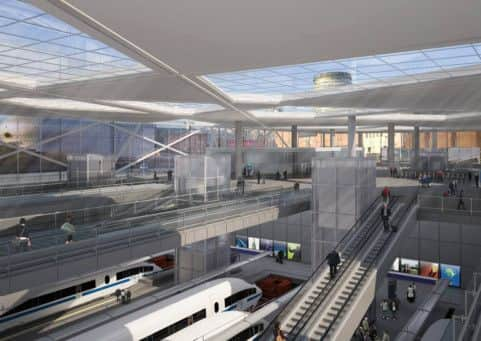YP Big Debate: Battlelines drawn as HS2 D-day nears


IT ought to be a matter of national pride that Britain is home to the oldest railways in the world. This, of course, is a land of rail pioneers, from the first passenger railway at Oystermouth to Richard Trevithick’s first steam locomotive and George Stephenson’s famous Rocket.
The rail revolution which transformed the 19th century started here in the north of England, those great Victorian industrialists leading the charge into the inter-connected age.
How times have changed.


Advertisement
Hide AdAdvertisement
Hide AdSomewhere along the line, somewhere between the mountainous debts of two world wars and the rise of the motor car and the infamous axe of Dr Beeching, Britain missed the next giant leap forward that rail travel made in the post-war years.
High-speed rail first took off in Japan in 1964, and has spread across Asia and mainland Europe over recent decades while Britain looked on, wistful and bemused.
So different an outlook does Britain hold these days that the Government’s plan to at last build its own high-speed network, linking up England’s largest cities, is perhaps the most controversial project of the age.
No other infrastructure scheme in recent times has caused such a furious debate. Ministers want a new fleet of nuclear submarines, a new wave of nuclear power stations, thousands of offshore wind farms. But none seem to divide people’s opinions as dramatically as HS2.
Advertisement
Hide AdAdvertisement
Hide AdHistory weighs heavily upon the debate. The Department for Transport (DfT) now speaks ruefully about our once-proud “Victorian” rail network, and the urgent need to build something fit for the 21st century.
“In Britain we try to patch up what we have already got,” Transport Secretary Patrick McLoughlin says. “We haven’t built a new main rail line north of London for almost 120 years.
“There is a point when patching up isn’t enough.”
Opponents are equally quick to point to the country’s supposedly poor historical track record of infrastructure schemes down the years, with costs frequently spiralling out of control and projects being completed many years later than planned.
Yet it wasn’t always like this. Strange as it now seems, high-speed rail was not a contentious issue even at the last election.
Advertisement
Hide AdAdvertisement
Hide AdFirst proposed by Labour in 2009, HS2 was supported by all three main parties in their 2010 election manifestos before the Coalition gave it the formal green light two years later.
The new line would link England’s largest cities, with gleaming 250mph trains racing along 330 miles of high-speed track to bring these vital urban centres closer together than ever before. The much-neglected North would be the greatest beneficiary, with new stations at Leeds, Sheffield and Manchester and improved journey times for York, Newcastle and Liverpool.
The economy would be boosted by £15bn-a-year. Tens of thousands of construction jobs would be created.
The project would cost a few billion pounds-per-year, effectively taking over the revenue stream currently funding London’s grand Crossrail project. For once, on a major infrastructure project, Britain appeared to have consensus.
It did not last long.
Advertisement
Hide AdAdvertisement
Hide AdThe first opposition erupted in the Chilterns, that leafy, wealthy corner of untouched South East England where residents awoke to find plans for a new rail line ploughing past their homes.
A boisterous, well-funded anti-HS2 protest group was formed. It found favour among a certain breed of Southern Conservative MP who naturally shies away from big public projects - particularly during such a severe spending squeeze.
But opposition has spread. The publication of route maps for the northern part of the scheme has unleashed a second wave of anger in villages along the route, such as Church Fenton on the outskirts of Leeds.
In Westminster, too, key figures have turned against the project - especially after Mr McLoughlin announced the potential cost of the new line had jumped from £33bn to £42.6bn - without factoring in the new trains.
Advertisement
Hide AdAdvertisement
Hide AdRight-wing lobby groups concluded the scheme was a waste of money. The Commons public accounts committee gave a withering assessment of its business case.
Council leaders in Wakefield and Bradford expressed doubts about the benefits to their own cities. Most importantly of all, key members of Labour’s frontbench team - chiefly the Shadow Chancellor, Ed Balls - began to consider withdrawing support.
“There is no blank cheque from the next Labour Government for HS2,” Mr Balls says. “We’ve always supported the idea of a new North-South rail link - but when I listen to David Cameron and George Osborne giving the impression that, even though the costs are going up billion by billion, and even though the benefits are becoming less clear, they are going to go ahead regardless, I think that is completely irresponsible.
“A Labour Treasury won’t treat public money in that way.”
Yet the Opposition party has offers no suggestion of how else it would deal with what the new Transport Minister, Baroness Kramer, called a “crisis in capacity” which is looming on Britain’s railways.
Advertisement
Hide AdAdvertisement
Hide AdThis is not a new problem. Indeed, the HS2 scheme actually has its roots in a report published by the DfT in 2004, assessing the case for a second high-speed network stretching north from the new HS1 link between London and the channel tunnel, the first phase of which had opened the previous year.
The report analysed the astonishing surge in rail travel which Britain has seen since the early 1990s - and concluded there was a case for a new line.
For after years of declining passenger numbers, rail use has exploded in popularity over the past 20 years. There are now twice as many journeys being taken as there were in 1993 – and there is no sign of the growth in numbers slowing down.
The network is beginning to creak under the strain.
“We’ve seen a level of growth in the rail sector that other industries can only dream of,” says Rupert Walker of Network Rail. “Last year alone we saw growth in demand of nearly eight per cent – not many other businesses have seen growth during the recession on that sort of scale. But this level of success doesn’t come without its challenges.”
Advertisement
Hide AdAdvertisement
Hide AdAlready, the main east and west coast lines are practically full in terms of the routes they can offer. Numerous provincial towns and cities complain of their lack of a direct link to London.
With both population and passenger projections continuing to rise, the trains themselves are also becoming full – firstly on commuter routes into the major cities, but increasingly along the rest of the main lines. The picture painted by Network Rail is bleak.
“The West Coast will be full by the mid-2020s,” Mr Walker says. “No more room for any more trains; no more room on the busiest services; more freight having to travel by road.
“Commuter trains are already overcrowded. But from the mid-2020s we predict some people with shorter commutes won’t be able to get on their trains at all.”
Advertisement
Hide AdAdvertisement
Hide AdOpponents question these figures. The DfT’s record on predicting passenger numbers is far from spectacular – demand for HS1 has not hit the heights expected by transport officials.
Those opposed to HS2 insist the communications revolution brought by high-speed internet means travel will become less important, and that capacity issues could be met by upgrading existing lines. Network Rail vehemently disagrees.
“Even if all the trains were lengthened, and the line upgraded to its maximum possible capacity, we still won’t be able to fit enough trains on the tracks to meet future demand,” Mr Walker says.
Nonetheless, Labour’s potential opposition to the project has left it teetering on the brink.
Advertisement
Hide AdAdvertisement
Hide AdAs David Cameron conceded yesterday, without cross-party backing it will be almost impossible to see through a project which is not due for completion until 2033.
Privately, the Prime Minister is deeply frustrated that Labour is playing politics with such an important project - and one that requires politicians on all sides to take a long-term, strategic view.
Next week Mr McLoughlin will once again restate the need for HS2, with the publication of an updated business case based on fresh analysis of the economics.
It will be a timely report.
For just two days later, the first of two HS2 Bills will return to the House of Commons for its third reading, with a minor rebellion anticipated on the Tory backbenches and only half-hearted support from Labour.
Advertisement
Hide AdAdvertisement
Hide AdThat Bill should pass into law. But the real crunch for HS2, will come when the second, more complex Hybrid Bill, starts to make its way through the House later this year.
Even with cross-party backing, its passage will be slow and tortuous. Should Labour come out in firm opposition, the prospect of HS2 ever being built may yet hit the buffers for good.
Forum for your views on major Yorkshire issues
The Yorkshire Post Big Debate series will give voice to the rich and varied views of the people of Yorkshire on the issues that matter, focusing on key areas that influence the lives of people living here and that impact on the prosperity of our region.
Why start with HS2? Yorkshire Post editor Jeremy Clifford explains: “There will not be a bigger issue with so much resting on a decision to invest so many billions of pounds on the infrastructure of this country than HS2.
Advertisement
Hide AdAdvertisement
Hide Ad“Yet, it is an issue that is dividing the country and the north of England. Politicians in Westminster and the regions have different views and business leaders are also divided about the merits of the project. Many communities, too, are unconvinced of the advantages of such a big spending scheme.
“This is where the Yorkshire Post steps into the debate. With so much riding on the decision, it is our belief that we should take a leading role in shaping the debate, to analyse the issues, and to provide a platform for discussion. There is no other organisation so well equipped to do the job of bringing together, the public, politicians and business leaders to discuss the merits of the scheme and to present them back to the decision makers.
“So we urge you to have your say, to read what the experts have to say and to engage in the debate on any of our media platforms. You will be taking part in the decision about the biggest investment project in this country in our generation.”